|
The Institute of Directors in South Africa (IoDSA) welcomes the announcement that two former directors of AYO Technologies have been disqualified from serving on the board of any listed company for the next five years. The two directors were members of the company’s Audit and Risk Committee; and the censure results from their failure to fulfil their oversight roles in relation to the 2018 interim results, which contained a number of material errors.
“The JSE’s ruling underlines the fact that directors have a pivotal role to play which is legally defined, and that there are serious consequences for not fulfilling it,” says Parmi Natesan, CEO, IoDSA. In its communication on this matter, the JSE outlined a number of points that directors should note carefully. The Companies Act stipulates that a director must exercise his or her powers and perform his or her functions in good faith, for proper purpose and with the degree of care, skill and diligence that may reasonably be expected of a person carrying out the same functions and having the general knowledge, skill and experience of that director. The two admitted to having scant knowledge of corporate governance or the rules and regulations governing the financial reporting of a JSE-listed company. They further conceded that they were inexperienced directors and so had not fulfilled the duty of ensuring that AYO Technologies had proper financial reporting procedures in place. The conclusion is clear. Better due diligence by nominations committees and shareholders is necessary before directors are appointed. In addition, the candidates themselves should not accept a board position if they do not have the requisite understanding of their duties, and the skills and experience to discharge them. Once appointed, directors have to participate actively and make a positive contribution. “This censure is welcome because it emphasises the principle of accountability in corporate life. However, the banning only applies to listed companies, so the two individuals could theoretically still serve on the boards of non-listed companies or other organisations,” Ms Natesan argues. “This serves to highlight the importance of the nomination and appointment process for members of the governing body of all types of organisations: only individuals who have the right qualities and, most important, skills and experience should be eligible to be considered for such an important role.” Related to this, the IoDSA has introduced two SAQA-registered director designations to assure that individuals meet minimum standards and are assessed against a Director Competency Framework. The designations also require that holders keep their skills updated via continuous professional development, and are bound by a code of conduct. “We commend the JSE for this bold step and encourage more regulators, nominations committees and shareholders to ensure that a new generation of directors is properly equipped to discharge their important role, both their benefit and ours,” she concludes. ENDS MEDIA CONTACT: Stephné du Toit, 084 587 9933, [email protected], www.atthatpoint.co.za For more information on the IoDSA please visit: Website: www.iodsa.co.za Twitter: @The_IoDSA LinkedIn: Institute of Directors in Southern Africa Company Page
0 Comments
As the Zondo Reports so graphically demonstrate, South Africa’s state-owned enterprises (SOEs) are in a truly lamentable state, with dire consequences for the economy and thus our country’s capacity to deliver reliable services to citizens, to create jobs and build a better life for all.
“Reading the recently-released Zondo Reports, it is clear that the rot comes from the top—the IoDSA urges the President to provide the courageous leadership the circumstances demand and set a new course, in which board and senior executive appointments will be guided by objective processes and criteria based on competence and an ethical commitment to the organisation’s best interests,” says Parmi Natesan, CEO, Institute of Directors in South Africa (IoDSA). “We are surely at or close to Ground Zero when it comes to rescuing our SOEs. The last SONA made no mention of the need to appoint the right people to the boards of SOEs, though previous ones highlighted this important issue. The President has to act now, or it may be too late.” The first two Parts of the Zondo Commission’s Report have caused a major upset because they have laid bare in clinical detail the extent to which the long-term sustainability of vital SOEs has been compromised. As the Reports make clear, the damage has largely been done by incompetent or dishonest board members and senior executives, and overly prescriptive Ministers. “There’s no getting away from it: the parlous state of our SOEs is a direct consequence of the breakdown of good governance,” she argues. “While there’s no easy way out, fixing the governance at our SOEs is an essential first step. “In his 2020 SONA, the President spoke about the need to stabilise the SOEs and yet chose not to address the vital leadership issue, which may be one of the reasons why we are still where we are today. He must not shirk his clear duty this time around, and civil society needs to unite to put pressure on Government to take the necessary steps to restore good governance at the SOEs. A first step must be a commitment to abide by the principles of King IV when it comes to appointing board members and senior executives.” ENDS MEDIA CONTACT: Stephné du Toit, 084 587 9933, [email protected], www.atthatpoint.co.za For more information on the IoDSA please visit: Website: www.iodsa.co.za Twitter: @The_IoDSA LinkedIn: Institute of Directors in Southern Africa Company Page In view of their important role in supporting governance, boards must take steps to protect whistle-blowers and promote a culture of whistle-blowing.
By Parmi Natesan, CEO, Institute of Directors in South Africa The Zondo Commission’s first report highlights the key role that courageous individuals play in raising the alarm about corruption in general, and state capture in particular. People like Cynthia Stimpel at South African Airways and Athol Williams at Bain Consulting, it says, are “one of the most effective weapons against corruption.”[1] At the same time, though, the report makes the important point that the whistle-blower must be able to “trust that the disclosure will be treated in strict confidence and that the recipient can offer adequate protection against harm”.[2] The importance of whistle-blowers is also recognised in King IV. In particular, King IV recommends that in its management of ethics the board not only puts mechanisms for reporting ethical breaches in place, but deals with such disclosures “appropriately”.[3] As the report makes clear, this recommendation was simply not implemented various state-owned enterprises with devastating impact on their long-term sustainability, but also on the whistle-blowers themselves. Clearly, boards who take seriously their fiduciary duty to safeguard the long-term interests of their organisations must take heed of these findings and put measures in place to encourage whistle-blowing and also ensure that whistle-blowers themselves are protected from negative consequences. How to do it Cynthia Stimpel believes that creating a safe space in which people feel able to raise difficult questions without being victimised is the vital first step. Of course, creating a corporate culture is never easy or quick—it’s a slow, incremental process, she emphasises. “There are a lot of difficult conversations we need to have in South Africa, and they are just not happening,” she says, adding that personal courage is a prerequisite here. A comprehensive policy is an important building brick, Ms Stimpel says, something that The Ethics Institute’s Liezl Groenewald backs. Ms Groenewald notes that the Protected Disclosures Amendment Act makes it mandatory to have a policy. A policy is not enough on its own. Ms Groenewald says that it must be complemented by a range of channels that whistle-blowers can use. All too often, companies implement a hotline and consider the work done. However, research conducted by the Institute shows that a substantial 42% of South African workers prefer to report ethical violations to their line manager, with 13% opting for HR, 11% for risk management and 11% for another manager. Only 2% use the hotline.[4] Once a complaint is reported, it is vital that action is taken—only then will employees believe that the culture exists. Action, yes, but it must be the right action: the complaint must be investigated by the right individuals, confidentiality must be maintained and then consequences must follow. A key principle is that all complaints must be collated in a central node so that they can be monitored, and proper reports supplied to the board. The loop then needs to be closed by advising the complainant that an investigation has taken place and that action has been taken—the details don’t need to be given, Ms Groenewald adds. Because of their leadership role, Ms Stimpel feels that the CEO and executive team are pivotal. As always, boards have to play an oversight role—they must ensure that they receive the reports and interrogate them deeply. Given that directors are often part of the problem, she believes they should be members of the IoDSA so they can be held accountable. Training is an important piece of the puzzle. Directors can benefit from the programmes created by the IoDSA, but everybody in the organisation needs to know why whistle-blowing is so important as a way to protect the organisation (and thus their jobs), how to identify unethical behaviour and finally how to report it. Finally, protection. Clearly, providing an environment in which these kinds of concerns can be safely raised is part of it, as is scrupulous confidentiality during the reporting/ investigation/ action process. When and if the whistle-blower’s identity becomes known, the company can assist with better home security or a transfer to another office. Whistle-blowing, as the Zondo report says, have a vital role to play in fighting corruption. We must make it easier—and safer—for them in the future. ENDS MEDIA CONTACT: Idéle Prinsloo, [email protected], 084 587 9933, www.atthatpoint.co.za For more information on the IoDSA please visit: Website: www.iodsa.co.za Twitter: @The_IoDSA LinkedIn: Institute of Directors South Africa Company Page Facebook: Institute of Directors South Africa The testimony of Mr Popo Molefe, the current chairman of Transnet, as set out in Part 2: Volume 1 of the Zondo Report (Zondo 2)[1] makes sensible and far-reaching suggestions relating to board and executive appointments at SOEs. Parmi Natesan, CEO of the Institute of Directors in South Africa (IoDSA) says that the IoDSA has been raising these same issues for many years.
“One of the most encouraging outcomes of the Zondo Commission is surely the public ventilation of important issues, and the fact that in this case the comments are made by a leading figure in business and political circles is heartening,” says Parmi Natesan, CEO of the IoDSA. “We recently wrote to Deputy Chief Justice (DCJ) Zondo in his role as chair of the Commission to ask that the report included a number of recommendations, and some of these were echoed by the Report’s summation of Mr Molefe’s views.” Mr Molefe’s overriding point was that the state capture project was characterised by the appointment of boards and senior executives to serve other interests than those of the organisation. This is an issue that the IoDSA has repeatedly emphasised, directors have to understand that they have a legal duty to the organisation and not to whoever appointed them. At the same time, board nominees must have the skills needed to function effectively as a director within the context of the organisation’s strategy. In our letter to the DCJ, we made the point that directors should ideally be measured against an objective competency framework and also required to be members of a professional organisation so they can be held accountable and disciplined. The IoDSA has developed a comprehensive Director Competency Framework and two Director designations to address these issues, so providing a way for nomination committees to identify individuals who are both suitably qualified and subject to a Code of Conduct. It is absolutely vital that board appointees understand their legal obligations and have the skills to do their jobs properly—if they do not, they face the real possibility of having to accept personal liability for losses suffered by the company. Mr Molefe’s testimony also proposes an alternative to the current flawed nomination and appointment process. In order that individuals with the right level of qualifications and ethics are appointed, a dedicated body or committee that is representative of various stakeholders should be convened to vet candidates, along the lines of the Judicial Service Commission. “Whether it’s a separate committee or the board itself, the principle is a sound one because it removes political interference from the nominations process, instead focusing on the candidates’ competence and ethical standpoints,” Ms Natesan sums up. “We are agreed that the goal is to get the right people with the right skills onto our boards.” ENDS MEDIA CONTACT: Idéle Prinsloo, [email protected], 084 587 9933, www.atthatpoint.co.za For more information on the IoDSA please visit: Website: www.iodsa.co.za Twitter: @The_IoDSA LinkedIn: Institute of Directors South Africa Company Page Facebook: Institute of Directors South Africa [1] Judicial Commission of Inquiry into State Capture Report: Part 2: Volume 1, available at https://cisp.cachefly.net/assets/articles/attachments/87235_part_2_vol_1_trasnet_report_of_the_state_capture_commission_part_ii_vol_i_010222.pdf. See particularly 1017 – 1020. Volume 1 of the second Zondo Report (Zondo 2),[1] which deals with Transnet, graphically shows how important it is for a CEO to appointed who has the right qualities—and, consequently, the board’s respect. CEO appointments should be the prerogative of the board in terms of governance best practice, argues Parmi Natesan, CEO, Institute of Directors in South Africa (IoDSA).
“Appointing the CEO is one of the board’s most critical functions, and it is absolutely imperative that they do a thorough due diligence before making that appointment,” she says. “The Transnet saga also demonstrates something the IoDSA has been calling out for years: the dangerous role confusion in SOEs when it comes to senior appointments. The Report implies that Mr Gama’s appointment as CEO of Transnet was only made possible because of sustained political interference to subvert good governance.” The challenge for SOEs is that their legislative framework gives Government, via the relevant Minister, the power to make senior appointments. However, this goes against good governance as outlined in King IV, which recommends that the Board appoint the CEO. According to the SOE supplement to King IV, “As a matter of good practice, the appointment of the CEO of an SOE should be a robust and transparent process that involves the Accounting Authority (Board) to the greatest extent possible, even if the shareholder has the right to make the final appointment.”[2] Initially, good governance prevailed. The board applied their collective minds and determined that Mr Gama did not have the skills needed to fulfil the role adequately, and he was not shortlisted. According to the Report, the then-Minister, Barbara Hogan, duly made her choice from the Board’s shortlist. However, then-President Zuma refused to accept it, demanding that an alternative candidate, Siyabonga Gama, be appointed. A new Minister and board later, another candidate favoured by President Zuma, Brian Molefe, was appointed at CEO. Mr Gama was later appointed to the position of Group CEO in 2016 during the tenure of Lynne Brown as Minister of Public Enterprises. At this stage, the Report infers that a more malleable board rubberstamped the appointment, even though Mr Gama had recently been dismissed as CEO of Transnet Freight Rail for serious acts of misconduct. The irony is that he was later also removed from his position as CEO of Transnet itself “…because of serious violations of his financial procurement and fiduciary responsibilities and the board having lost trust and confidence in his ability to lead Transnet” (at 164, p 72). Ms Natesan says that clear lessons emerge from this sequence of events that boards, and particularly boards of SOEs must take to heart:
“If the principles of good governance are flouted in an important area like this, the result is disaster, as this case so unfortunately shows,” Ms Natesan concludes. ENDS MEDIA CONTACT: Idéle Prinsloo, [email protected], 084 587 9933, www.atthatpoint.co.za For more information on the IoDSA please visit: Website: www.iodsa.co.za Twitter: @The_IoDSA LinkedIn: Institute of Directors South Africa Company Page Facebook: Institute of Directors South Africa [1] Judicial Commision of Inquiry into State Capture Report: Part 2, Vol 1: Transnet, available at https://cisp.cachefly.net/assets/articles/attachments/87235_part_2_vol_1_trasnet_report_of_the_state_capture_commission_part_ii_vol_i_010222.pdf. [2] IoDSA, Report on corporate governance for South Africa 2016, p 116. |
Archives
July 2024
Categories
All
|

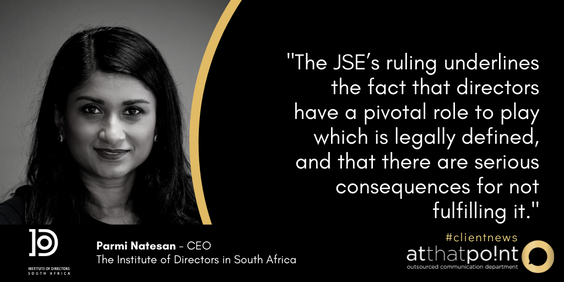
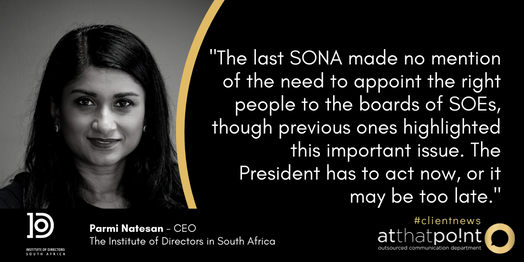
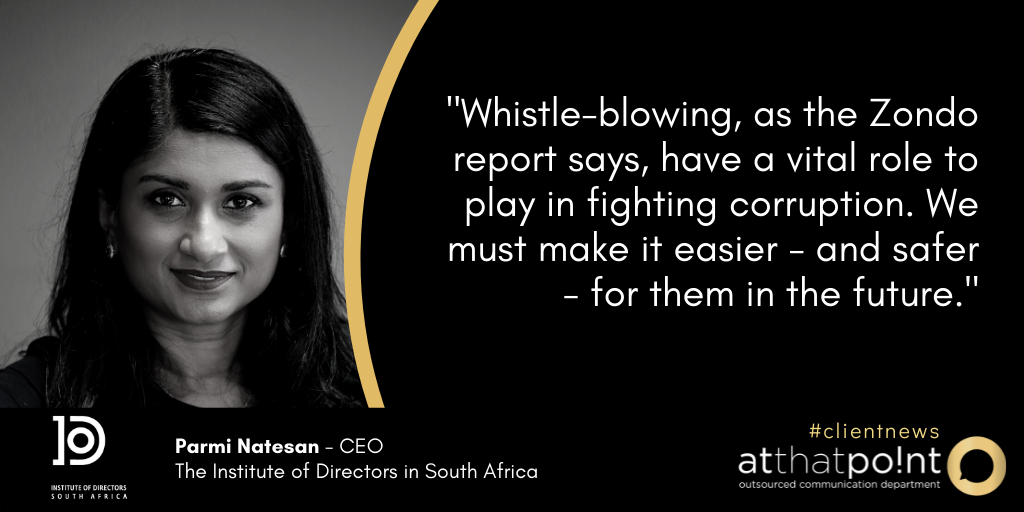
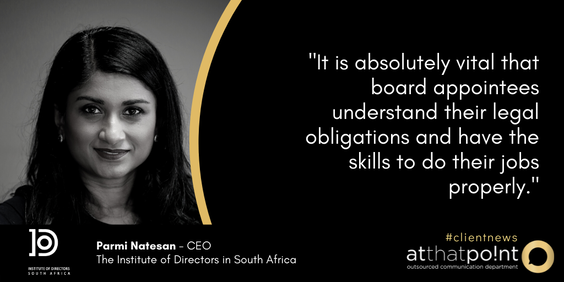
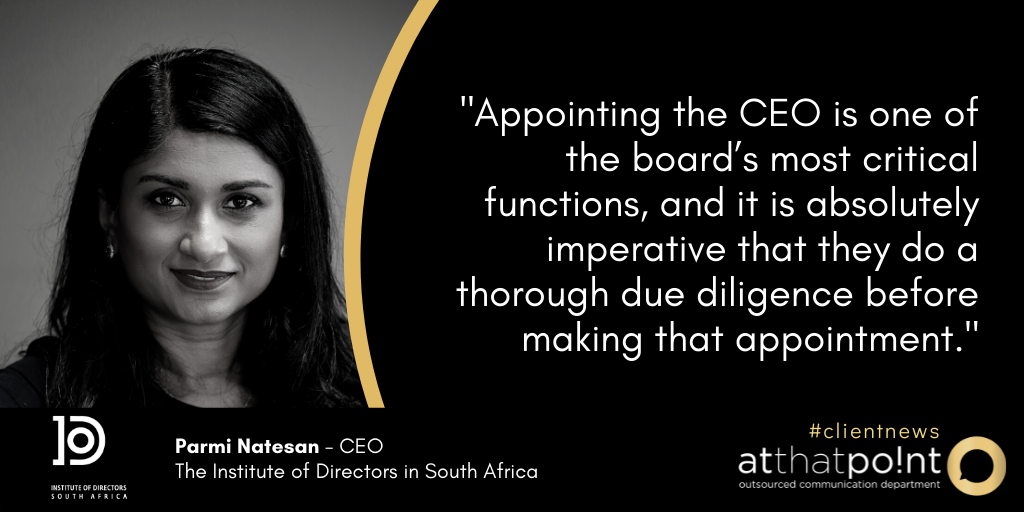
 RSS Feed
RSS Feed